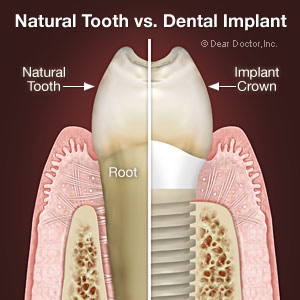Probably a day doesn’t go by that you don’t encounter advertising for dental implants. And for good reason: implants have taken the world of dentistry by storm.
Since their inception over thirty years ago, implants have rocketed ahead of more conventional tooth replacements to become the premier choice among both dentists and patients. But what is an implant—and why are these state-of-the-art dental devices so popular?
Resemblance to natural teeth. More than any other type of dental restoration, dental implants mimic both the appearance and function of natural teeth. Just as teeth have two main parts—the roots beneath the gum surface and the visible crown—so implants have a similar construction. At their heart, implants are root replacements by way of a titanium metal post imbedded in the jawbone. To this we can permanently attach a life-like porcelain crown or even another form of restoration (more about that in a moment).
Durability. Implant materials and unique design foster a long-term success rate after ten years in the 95-plus percentile. They achieve this longevity primarily due to the use of titanium as the primary metal in the implant post. Because bone has an affinity for titanium, it will grow and adhere to the post over time to create a well-anchored hold. With proper maintenance and care implants can last for decades, making them a wise, cost-effective investment.
Added stability for other restorations. While most people associate implants with single tooth replacements, the technology has a much broader reach. For example, just a few strategically-placed implants can support a removable denture, giving this traditional restoration much more security and stability. What’s more, it can help stop bone loss, one of the main drawbacks of conventional dentures. In like fashion, implants can support a fixed bridge, eliminating the need to permanently alter adjacent teeth often used to support a conventional bridge.
With continuing advances, implant technology is becoming increasingly useful for a variety of restorative situations. Depending on your individual tooth-loss situation, dental implants could put the form and function back in your smile for many years to come.
If you would like more information on dental implant restorations, please contact us or schedule an appointment for a consultation. You can also learn more about this topic by reading the Dear Doctor magazine article “Dental Implants: Your Best Option for Replacing Teeth.”


